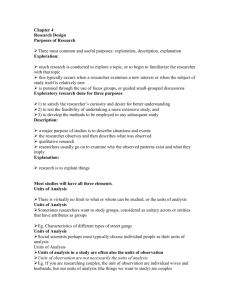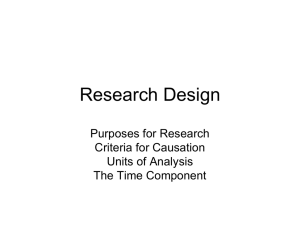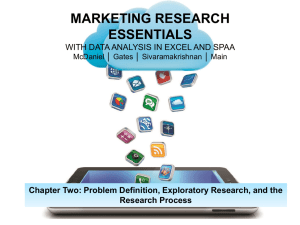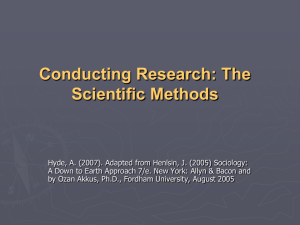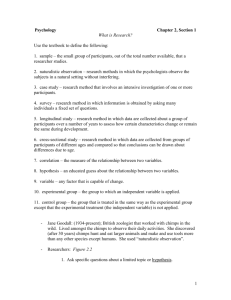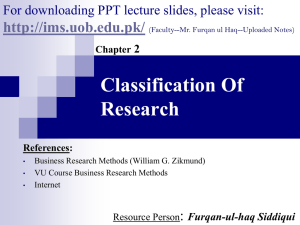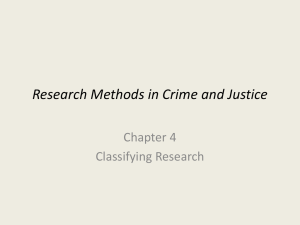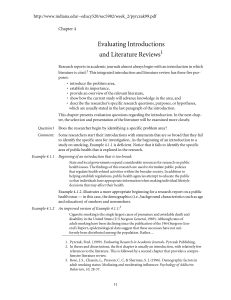Soc 210 - Chapter 4
advertisement
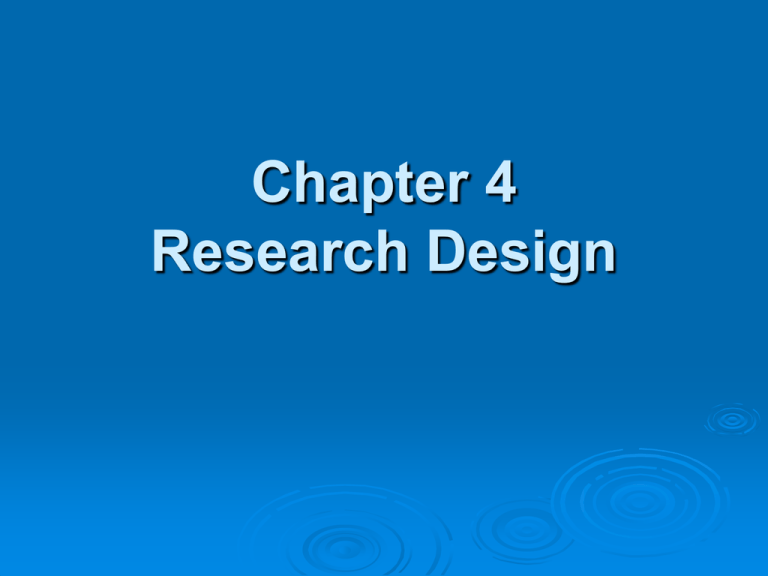
Chapter 4 Research Design Purposes of Research Three most common and useful purposes: exploration, description, explanation Exploration: much research is conducted to explore a topic, or to begin to familiarize the researcher with that topic this typically occurs when a researcher examines a new interest or when the subject of study itself is relatively new is pursued through the use of focus groups, or guided small-grouped discussions Exploratory research done for three purposes: 1) to satisfy the researcher’s curiosity and desire for better understanding 2) to test the feasibility of undertaking a more extensive study, and 3) to develop the methods to be employed in any subsequent study Description: a major purpose of studies is to describe situations and events the researcher observes and then describes what was observed qualitative research researchers usually go on to examine why the observed patterns exist and what they imply Explanation: research is to explain things Most studies will have all three elements. Units of Analysis There is virtually no limit to what or whom can be studied, or the units of analysis Units of Analysis Sometimes researchers want to study groups, considered as unitary actors or entities that have attributes as groups Eg. Characteristics of different types of street gangs Units of Analysis Social scientists perhaps most typically choose individual people as their units of analysis. Units of Analysis Units of analysis in a study are often also the units of observation Units of observation are not necessarily the units of analysis Eg. If you are researching couples, the unit of observation are individual wives and husbands, but our units of analysis (the things we want to study) are couples Units of Analysis Some studies try to describe or explain more than one unit of analysis Units of analysis are those things we examine in order to create summary descriptions of all such units and to explain differences among them Individuals include university students, gays and lesbians, autoworkers, Canadian voters, single parents, and professional athletes descriptive studies with individuals as their units of analysis typically aim to describe the population that comprises those individuals, whereas explanatory studies aim to discover the social dynamics operating within that population Groups we may be interested in characteristics that belong to one group, considered as a single entity Organizations Social Artifacts any product of social beings or their behaviour – books, poems, paintings – anthropologists social interactions – friendship choices, court cases, traffic accidents, divorces, fistfights, race riots The key is to be clear about what your unit of analysis is. Be Aware of the Ecological Fallacy ecological refers to groups or sets of systems: something larger than individuals ecological fallacy: is the assumption that something learned about an ecological unit says something about the individuals making up that unit The Time Dimension time plays many roles in the design and execution of research, aside from the time it takes to do research time affects the generalizability of research findings Cross-sectional studies: involves observations of a sample, or cross section, of a population of phenomenon at one point in time exploratory, descriptive and explanatory studies have an inherent problem: though their conclusions are based on observations made at only one time, they typically aim at understanding causal processes that occur over time there is a problem of generalizing from a snapshot Longitudinal are designed to permit observations of the same phenomena over an extended period can be more difficult for quantitative studies such as large-scale surveys Trend studies: a researcher who examines changes within a population over time Cohort studies: when researchers examine specific subpopulations, or cohorts, as they change over time typically a cohort is an age group: eg a national survey that is conducted every 20 years Panel studies: examine the same set of people each time Eg. A UK study that was conducted with children at age 7, 14, 21 problem: attrition Longitudinal studies generally have an obvious advantage over cross-sectional ones in providing information describing processes over time but they are costly and take a lot of time. The Research Process: A Closer Look Conceptualization: it’s necessary to clarify what we mean by these concepts in order to draw meaningful conclusions about them in surveys and experiments, such concepts need to be specified in advance in less tightly structured research, such as open-ended interviews, an important part of the research may involve the discovery of different dimensions, aspect, or nuances of concepts. Choice of research method: each method has its strengths and weaknesses, and certain concepts are more appropriately studied by some methods than by others Operationalization: here you decide on your measurement techniques Ethics ethical decisions will come into play when making decisions about your choice of topic, concepts, measures, and research methods Population and Sampling decide whom or what to study the population for a study is that group (usually of people) about whom we want to draw conclusions we might select a sample from among the data that might be collected and studied Observations collect empirical data Data Processing the data-processing phase of a survey typically involves the classification (coding) of written-answers and the transfer of all the information to a computer Analysis once the collected data are in a suitable form, you’re ready to interpret them for the purpose of drawing conclusions that reflect the interests, ideas, and theories that initiated the inquiry Application the final stage of the research process involves the uses made of the research you’ve conducted and the conclusions you’ve reached The Research Proposal Elements of a Research Proposal: Problem or Objective Literature Review Subjects for Study Measurement Data-Collection Methods Ethical Approval Analysis Schedule Budget
